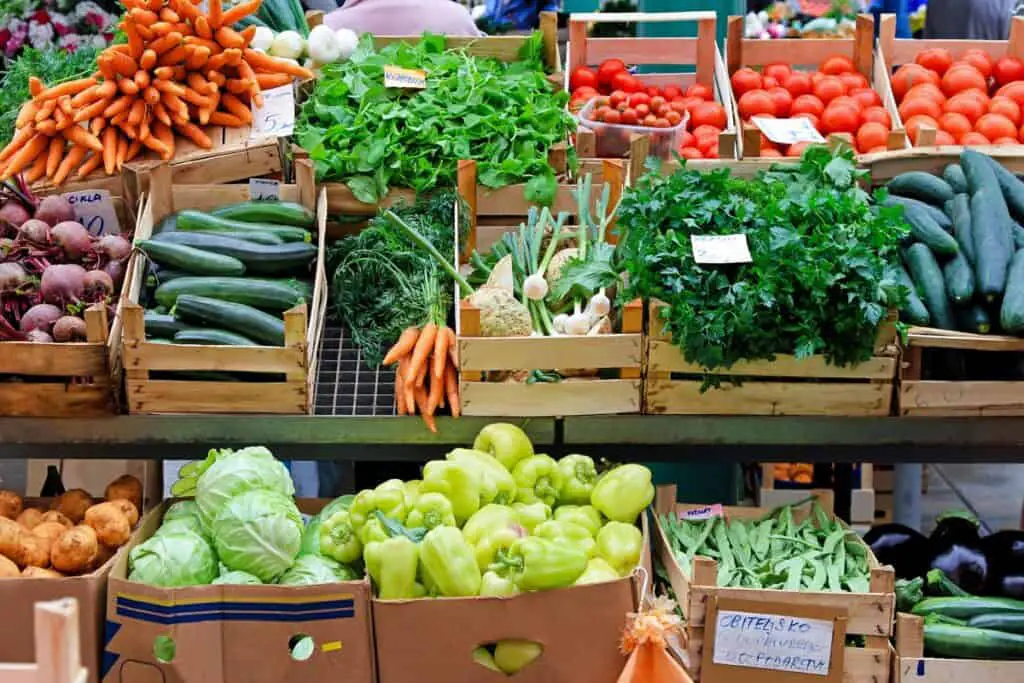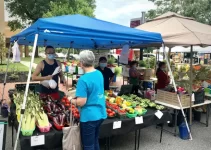If you live in a bustling British city, it can be easy to forget that the UK is still a proud agricultural nation. The British landscape, culture, cuisine, and even national identity continue to be shaped by the food we produce, the livestock we raise, and the land that’s used to grow crops.
Farmers markets are a time-honoured space in your village which you can encounter fresh, locally grown produce and the people who harvest it, without middle-men, distribution chains, or supermarket queues getting in the way.
They’re a welcome reminder of the UK’s agricultural heritage and the vibrant farming community that still operates today up and down the country, helping to get wholesome, organic food out of the fields and onto our plates.
So what exactly is a farmers’ market? Where can you find them? What can you buy there, and why bother?
Let’s take a closer look at what happens when local communities come together with local producers to buy and sell fresh, local products, grown, picked and packaged often just miles from the market itself.
What is The Meaning of Farmers Market?
The basic function of a farmers’ market is to provide a space in which local producers, farmers, and food merchants can sell their produce directly to customers, without having to go through wholesalers, large distribution networks, or supermarket chains.
They’re a place where customers can stroll from stall to stall, browsing produce at their leisure and talking with stall owners directly about the products they have to offer.
You can find all manner of fruit and veg, dairy products, raw meats, baked goods, and even locally made arts and crafts at your local farmers’ market, depending on the specifications of the market organisers.
Keen farmers’ market goers often love the variety that can spring up between markets just a few towns apart from one another.
Farmers’ markets come in all shapes and sizes, from indoor spaces co-opted into a covered area for stall holders, to great outdoor arenas and parking lots peppered with bunting and tarpaulin tents.
Wherever there’s a demand for fresh, locally sourced produce, there’s likely a farmers’ market catering to that demand.
Many farmers’ markets in the UK today still require stall owners to bring produce fresh from the field and to be based within a certain radius of the market itself.
Some vegetables will have been dug straight from the ground only days before appearing before eager market punters.
Most of the farms and producers that bring stock to market will be based in the region, with many harvesting from land just down the road.
It’s this local flavour and focus on regionally sourced food that keeps many people coming back to their local farmers’ market week after week, helping to put money back into the community without larger brands or chain-stores pocketing the profits.

What is The History of Farmers Markets?
You can reasonably argue that farmers’ markets, in their most fundamental form, have been around for as long as humans have been growing and selling food.
Up until comparatively recently in our history, practically all food would have been grown, harvested, and then distributed and sold to local communities via local markets and stalls operated by farmers themselves.
The selling of fresh produce direct from farmers to customers is a simple, effective and environmentally-friendly supply chain that only really started to be disrupted, in England at least, in the 1600s and 1700s.
Broader disruptions took place during the Industrial Revolution and the accompanied growth in global trade of commodities such as sugar, cotton, spices, and other foreign-grown food items.
In the post-war era, globalisation and leaps in technology turned what had once been predominantly local, grower-to-household supply chains into vast international distribution networks and supermarket empires.
The modern day farmers’ market, particularly in the UK, has been a conscious response to globalisation, an attempt to relocate food production and consumption within local communities, and to try to reduce some of the harmful environmental impacts of shipping food thousands of miles before it reaches our plates.
Bath Farmers’ Market claims to be the first farmers’ market to have been consciously established in the UK in order to help boost the local economy and promote sustainable development and farming practises.
Since it’s inception in 1997, numerous other Local Councils and land-owners up and down the country have responded to a growing demand for fresh, organic, locally-sourced produce that you can see and feel before buying.
Does The UK Have Farmers Markets?
Absolutely! It’s difficult to put an exact number on how many farmers’ markets there are in the UK, but it’s likely to be more than 1,000.
The National Farmers’ and Retail and Markets Association reported to parliament in 2009 that there were 800 farmers’ markets registered in the UK, and that number has likely increased significantly in the intervening years.
The UK has a number of features that make it a prime location for farmers’ markets to establish themselves.
Firstly, a huge proportion of UK land is given over to farming and agriculture, roughly 70% (for context, the percentage of USA land given over to farmland is around 40%, and Germany is around 50%).
Britain is, at least when seen in this light, a farming nation, with plenty of home grown produce that can benefit from being sold as locally and as quickly as possible.
Britain is also a densely populated yet geographically small island. This means that most areas have high enough numbers of people to make farmers’ markets commercially viable, especially since the physical distances one needs to travel in order to reach their local market are often manageable.
So where can you find these farmers’ markets? Well, anywhere really! Your local town is almost certain to have at least one in the close vicinity, with local villages and other settlements potentially having their own as well, depending on demand.
Cities have them too. Manchester, Birmingham, London, Sheffield, Leeds – it doesn’t matter if you’re an urbanite, there will be a farmers’ market near you, potentially more than one if you’re in a built-up area with a lot of suburban sprawl.
A summary Google search will show you around 20 farmers’ markets spread across Inner London alone.
The best way to find your local market? Get online and start searching – there are a number of handy sites that can help direct you to where best to buy locally sourced ingredients, including findlocalproduce.co.uk and farminguk.com, many of which have comprehensive farmers’ market listings for each region.
Where Are The Best Farmers Markets in the UK?
It’s difficult to gauge exactly what makes a great farmers’ market, and everyone will have their favourites, but generally speaking people are looking for a market that runs reliably and regularly, come rain or shine.
You want to be able to rely on your farmers’ market just as you would rely on your local corner shop or supermarket chain.
People also tend to want a good selection of stalls offering a wide variety of interesting produce. Finally, you want enough foot traffic and custom to encourage stall owners to bring their best produce to the table, and to keep pitches competitive!
There are a number of factors that can help with all of this. Being close to, but not necessarily in the middle of, relatively large population centres can help bring plenty of customers to market.
It’s why a lot of popular farmers’ markets operate out of established market towns or on the edges of large cities, rather than being tucked away in small hamlets frequented by only a few people.
What’s more, you need your market to be easily accessible by regional producers and farmers.
It might be picturesque having a farmers’ market in the middle of a national park, but one located in a town in the middle of farming landscape is going to be closer to the agricultural action, so to speak.
The more local producers can access the market, the fresher and more diverse the produce is going to prove.
So bearing all this in mind, where are some of the best farmers’ markets in the UK?
The South is often spoiled for choice when it comes to popular farmers’ markets, particularly ones that score highly in readers’ polls and magazine reviews.
Winchester has a renowned and popular one, Bath still rates highly, Taunton and Truro both serve the South West admirably, and South East London regularly ranks as having some of the best city-based markets in the country.
Devon and Essex also have some lovely little villages that host popular farmers markets.
In the North, the Malton and Ripley farmers’ markets in North Yorkshire are often a big local draw, with Barnard Castle in County Durham and Orton in Cumbria also ranking highly. Midlands cities such as Birmingham and Nottingham also sport popular farmers’ markets.
That being said, your best bet is to find the farmers’ market that’s closest to you. There are likely to be a handful within easy driving distance, so why not try a few different ones out and see how they fare?
Remember, you can do most of your weekly vegetable and fruit shopping at a reasonably stocked farmers’ market, so why not swap out a trudge to the supermarket for a fun family trip?
Why Do People Buy From Farmers Markets?
There are a whole host of reasons why people like to swap their weekly supermarket sweep for a trip to the farmers’ market on a Saturday morning. Here are just some of them.
Farmers Markets Are Better For The Environment
In recent decades, most of us have become increasingly aware of the environmental impact that comes from shipping food halfway across the globe.
Transport emissions, reliance on fossil fuels, and potentially harmful, poorly regulated agricultural practises abroad all contribute to the problem.
Many of these factors are mitigated by farmers’ markets, where produce is grown locally, driven usually a very short distance, and then sold direct to consumers.
Food sold at farmers’ markets is often seasonal, meaning it’s been grown naturally and without resorting to environmentally costly methods to bring it to your table.
Farmers’ markets also encourage less food waste. Many stall owners will allow you to buy the exact amount of produce you need.
Whether you’re looking for 150g of cheddar taken straight from the wheel, a pinch of rosemary, or a tiny handful of fresh beetroot, farmers’ markets can make it easier for home cooks to buy only the ingredients required, rather than plastic bags full of prepackaged vegetables.
Farmers Markets Allow You to Speak Directly to Producers
One of the great attractions of a farmers’ market is that you get to meet and greet the producers of the food you’re about to buy.
Ask them questions, get recipe tips, maybe even try a sample before you part with your cash, and perhaps make a few new friends in the process!
Good stall owners will always be more than happy to talk with you about their wares and should be able to answer any questions you have about how a product is grown, harvested, and brought to market.
Farmers Markets Are a Fun Experience
People don’t necessarily look forward to doing the rounds at a local supermarket, but farmers’ markets can be an exciting day out for you and your family.
Not only is there the joy of walking from stall to stall and seeing what you might find, but modern farmers’ markets often come with a range of other services and food stalls catering to families who want to relish their shopping experience rather than merely enjoy it.
Fresh coffee carts, tasty food trucks, even live music and art studios can crop up in order to make a day at the farmers’ market a more interesting experience than just wandering through a fruit and veg aisle. The kids will love it too, with sights, smells, and plenty of space for them to explore.
Farmers Markets Help Support Local Jobs and Communities
Not only does buying local help to reduce the environmental impact of your food, it can also help keep money invested in local communities, rather than profits getting rerouted through corporations and global logistics chains.
Local farmers and producers often get a far better deal per sale when selling through a farmers’ market, without that necessarily resulting in a much higher cost for the customer.
The more customers that can support this, the more money can be kept invested in local jobs and small businesses.
Farmers’ markets can also support local communities in other, non-quantifiable ways.
Many small towns, villages and suburbs find their local farmers’ market to be an important part of the local social fabric, helping to connect residents and local businesses, and providing a fun focal point for young families on the weekend.
Farmers Markets Can Encourage Healthy Eating Habits
Perhaps not so much if you restrict yourself to the cake and pastry stalls, but generally speaking the profusion of fresh fruit and vegetable on offer at a farmers’ market makes for a healthy, organic and enticing spread.
Even foods that are wise to eat in moderation, such as cheeses, dairy products, and red meat, are likely to be locally sourced or locally made if you’re buying from a market stall, rather than being pumped full of chemicals and preservatives to help maintain shelf life.
Farmers Markets Can Offer an Interesting Variety of Produce
Farmers’ markets usually can’t compete with the sheer range of products on offer at a huge supermarket store. However, if you’re looking for an interesting variety of local produce, you might be pleasantly surprised by just how much you can discover strolling through the stalls.
Instead of the bland homogeneity of a corporate store, where produce is usually sourced from a small number of mass producers and tightly controlled to ensure it hits the shelves looking as consistent as possible.
Your local farmers’ market is likely to have numerous varieties of vegetables and fruits grown under different conditions, appearing in different sizes, and even tasting different to one another.
Carrots in colourful bundles, piquant radishes in strange shapes, and locally harvested honey with its own individual flavour can all be found at farmers’ markets up and down the country, not to mention a whole host of other delights you won’t find at the local superstore.
Are Farmers Markets Cheaper than Supermarkets in the UK?
This is often one of the first things that people who are considering shopping at a farmers’ market for the first time want to know – sure, it might be fun, interesting and novel, but is it going to save them money?
It’s difficult to answer this categorically, as prices for produce can range up and down the country and depending on the season.
You can get astounding bargains at farmers’ markets, particularly if stall owners are open to negotiation or trying to get rid of stock before closing.
You might even get away with a bit of good natured, polite haggling if you can ingratiate yourself with a particular stall owner!
That being said, it’s generally the case that supermarkets these days can usually compete with, if not downright beat, farmers’ markets on price. This is because huge corporate chains have a purchasing power and scaleability that simply can’t be matched by local marketplaces.
What’s more, huge supermarket chains can often demand exceedingly low wholesale prices from their producers, given the huge orders they’re prepared to place.
But don’t be too easily discouraged. The price difference is likely to be less than you think, particularly when it comes to staple market products such as fruit and veg.
When it comes to fresh vegetables from the local farms, a good farmers’ market should still be able to compete relatively well with local supermarket prices.
This is particularly true when you consider that fruit and veg can often be brought in smaller, weighable amounts in a farmers’ market, ultimately saving you money by helping you to purchase only what you need.
How many times have you gone for a multipack of bell peppers because it’s the only option there, knowing full well you only need one?
On the other hand, cooked products such as pies, pastries, breads, and other artisanal items that commonly appear at farmers’ markets, are usually more expensive than cheap options at a superstore.
A locally baked sourdough is unlikely to match a mass produced, budget white loaf when it comes to price. That being said, a huge factory line is rarely going to beat a local baker when it comes to nutrition and taste.
What is Sold at a Farmers Market?
The stars of the show at a traditional farmers’ market are fresh fruits and vegetables, harvested from local farms and brought directly to the stalls. Nowadays though you can expect to find far more than just basic groceries.
And remember, farmers’ markets are often seasonal, with stalls and pitches changing regularly. One of the great joys of frequenting your local market is that it will never offer the same produce on any two days.
Stall owners can sell anything from local cheeses to bottled elderflower cordials, handmade cakes to home cooked jams, flowers arranged on site to sausages made just down the road.
Some of the more bustling farmers’ markets have even branched out to include other interesting local merchants, such as artists, handicraft makers, or clothing designers.
You’re also likely to find a selection of stalls and cooking vans set up to cater for hungry customers who want something to eat or drink there and then.
In short, you may find yourself surprised at the sheer variety on offer. The only way to find out, is to get down there yourself and have a look.


